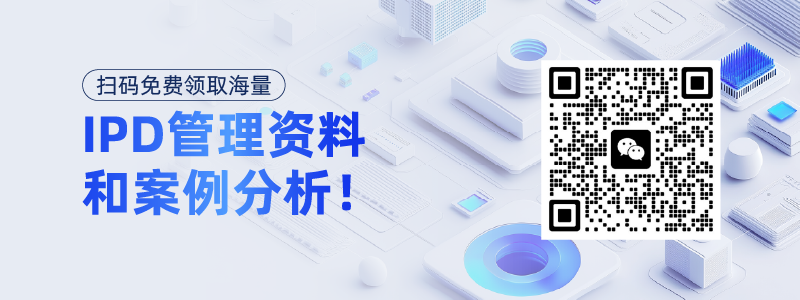ZenTao
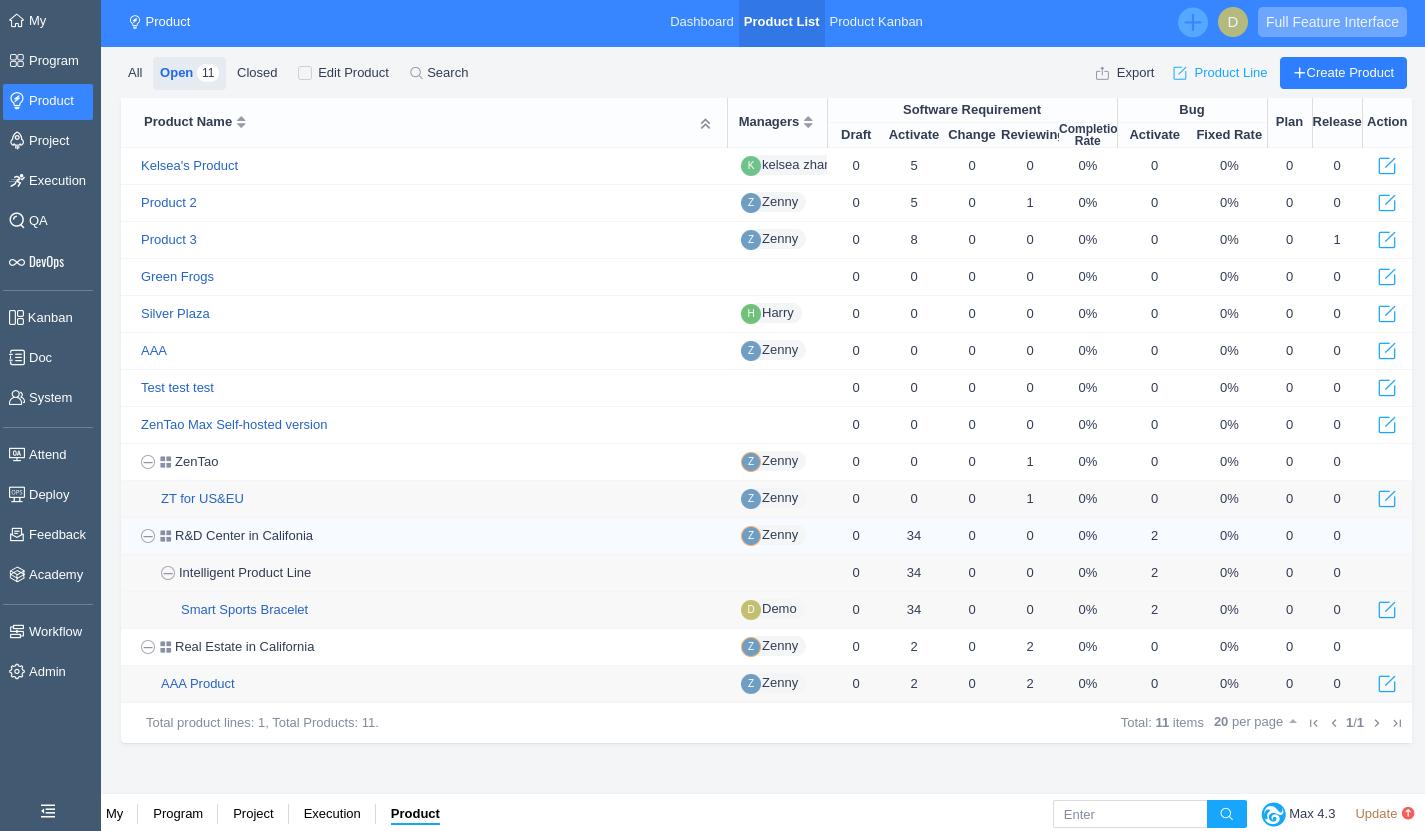
ZenTao is an open-source project management tool specifically designed for agile development teams. It integrates project management, bug tracking, and test case management into a single platform, making it a comprehensive solution for software development projects. ZenTao’s user-friendly interface and robust features allow teams to manage their tasks efficiently, track progress, and ensure that all aspects of the project are aligned with the overall goals. Its emphasis on agile methodologies makes it particularly suitable for companies looking to adopt iterative development practices.
One of the standout features of ZenTao is its ability to provide real-time insights into project status. Teams can easily visualize their workflows using Kanban boards, Gantt charts, and burn-down charts, which help in identifying bottlenecks and optimizing processes. Additionally, ZenTao supports collaboration by allowing team members to comment on tasks, share files, and communicate seamlessly within the platform. This fosters a culture of transparency and accountability, which is crucial for successful project execution.
For companies embarking on digital transformation, ZenTao offers the flexibility and scalability needed to adapt to changing requirements. Its open-source nature means that it can be customized to fit specific business needs, making it a versatile choice for organizations of all sizes. By leveraging ZenTao, companies can streamline their development processes, improve team collaboration, and accelerate their digital transformation journey.
LiquidPlanner
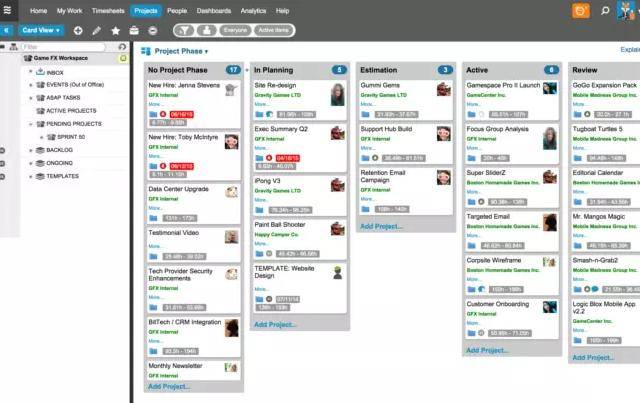
LiquidPlanner is a dynamic project management tool that uses predictive scheduling to help teams manage their workloads more effectively. Unlike traditional tools that rely on static timelines, LiquidPlanner takes into account the uncertainty and variability inherent in project tasks. It uses a range-based estimation approach, allowing teams to set best-case and worst-case scenarios for task completion. This provides a more realistic view of project timelines and helps in managing expectations.
One of the key advantages of LiquidPlanner is its ability to prioritize tasks based on resource availability and project deadlines. The tool automatically adjusts schedules as new tasks are added or existing ones are modified, ensuring that teams always have an up-to-date view of their workloads. This dynamic scheduling capability is particularly useful for companies undergoing digital transformation, where priorities can shift rapidly, and flexibility is essential.
LiquidPlanner also offers robust collaboration features, including task comments, file sharing, and real-time updates. Teams can easily communicate and coordinate their efforts, reducing the risk of miscommunication and delays. Additionally, the tool provides detailed analytics and reporting, allowing managers to track progress, identify potential issues, and make data-driven decisions. By adopting LiquidPlanner, companies can enhance their project management capabilities, improve resource allocation, and achieve their digital transformation goals more efficiently.
Hubstaff
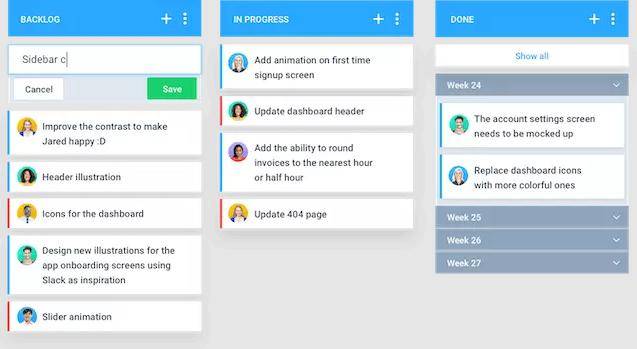
Hubstaff is a time tracking and productivity monitoring tool that helps companies manage remote teams and optimize their workflows. With the rise of remote work, especially in the context of digital transformation, Hubstaff provides a solution for ensuring that teams remain productive and accountable, regardless of their location. The tool offers features such as time tracking, activity monitoring, and GPS tracking, giving managers visibility into how time is being spent on various tasks and projects.
One of the standout features of Hubstaff is its ability to generate detailed reports on team productivity. Managers can view time logs, activity levels, and project progress, allowing them to identify areas where improvements can be made. This data-driven approach helps in making informed decisions about resource allocation and task prioritization. Additionally, Hubstaff integrates with popular project management tools, enabling seamless synchronization of data across platforms.
For companies focused on digital transformation, Hubstaff offers the added benefit of fostering a culture of accountability and transparency. By providing insights into team performance, the tool encourages employees to stay focused and meet their deadlines. Moreover, Hubstaff’s invoicing and payroll features simplify the process of managing payments for remote teams, ensuring that financial transactions are handled efficiently. By leveraging Hubstaff, companies can enhance their remote work capabilities, improve productivity, and accelerate their digital transformation efforts.
nTask
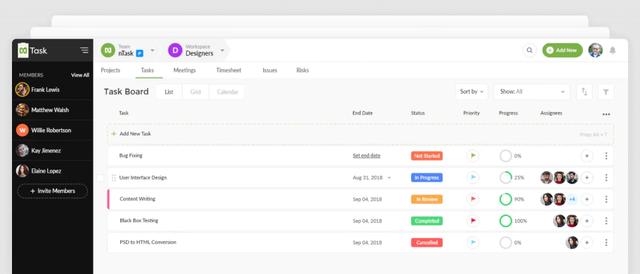
nTask is a versatile project management tool that combines task management, time tracking, and collaboration features into a single platform. Designed for teams of all sizes, nTask simplifies project planning and execution by providing a centralized hub for all project-related activities. Its intuitive interface and comprehensive feature set make it an ideal choice for companies looking to streamline their workflows and improve team collaboration.
One of the key strengths of nTask is its ability to handle multiple projects simultaneously. Teams can create tasks, set deadlines, and assign responsibilities with ease, ensuring that everyone is on the same page. The tool also offers Gantt charts and Kanban boards, allowing teams to visualize their progress and identify potential bottlenecks. Additionally, nTask supports time tracking and expense management, making it a valuable tool for managing budgets and ensuring that projects stay on track.
For companies undergoing digital transformation, nTask provides the flexibility and scalability needed to adapt to changing requirements. Its integration with popular tools such as Slack, Google Calendar, and Zoom enhances its functionality, enabling seamless communication and collaboration. By adopting nTask, companies can improve their project management processes, enhance team productivity, and achieve their digital transformation goals more effectively.
Zoho
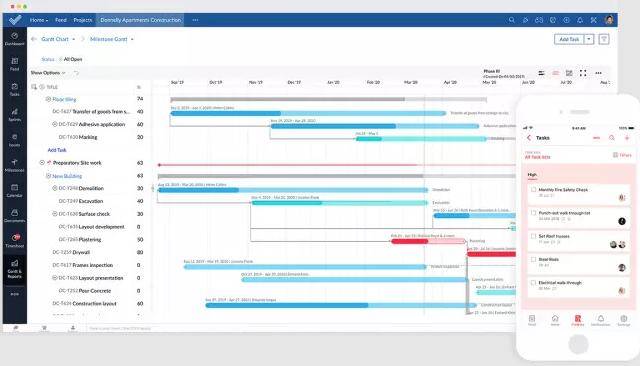
Zoho Projects is a comprehensive project management tool that offers a wide range of features to help teams plan, track, and collaborate on projects. Part of the Zoho suite of business applications, Zoho Projects integrates seamlessly with other Zoho tools, providing a unified platform for managing all aspects of a project. Its robust feature set and user-friendly interface make it a popular choice for companies of all sizes.
One of the standout features of Zoho Projects is its ability to handle complex projects with multiple dependencies. Teams can create detailed project plans, set milestones, and track progress using Gantt charts and Kanban boards. The tool also offers time tracking, issue tracking, and document management, ensuring that all project-related activities are managed efficiently. Additionally, Zoho Projects provides real-time collaboration features, allowing team members to communicate and share files within the platform.
For companies focused on digital transformation, Zoho Projects offers the scalability and flexibility needed to manage evolving project requirements. Its integration with other Zoho applications, such as Zoho CRM and Zoho Analytics, enhances its functionality, enabling companies to streamline their workflows and gain valuable insights into their projects. By leveraging Zoho Projects, companies can improve their project management capabilities, enhance team collaboration, and accelerate their digital transformation journey.
Kintone
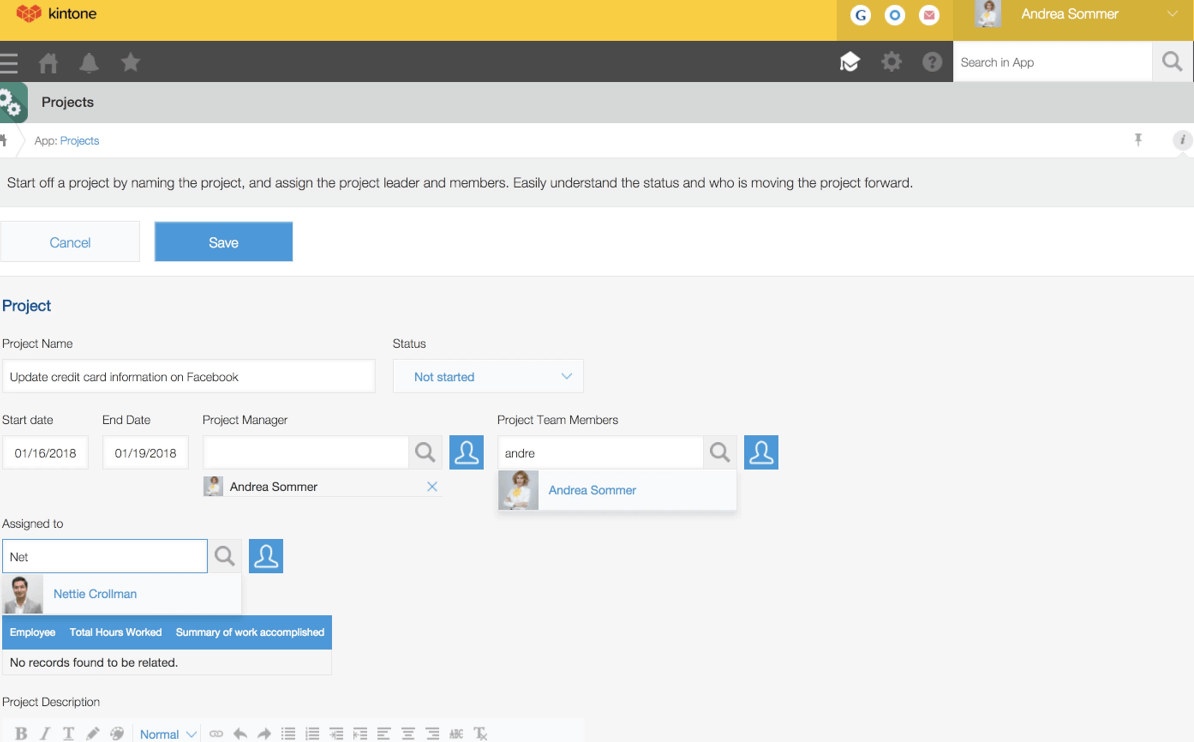
Kintone is a customizable project management platform that allows teams to create and manage workflows tailored to their specific needs. Unlike traditional project management tools, Kintone offers a high degree of flexibility, enabling companies to design workflows that align with their unique processes and requirements. This makes it an ideal choice for companies looking to adopt a more personalized approach to project management.
One of the key advantages of Kintone is its ability to integrate with a wide range of third-party applications. Teams can connect Kintone with tools such as Slack, Google Drive, and Salesforce, creating a seamless workflow across different platforms. Additionally, Kintone offers robust collaboration features, including task comments, file sharing, and real-time updates, ensuring that team members can communicate and coordinate their efforts effectively.
For companies undergoing digital transformation, Kintone provides the flexibility and scalability needed to adapt to changing requirements. Its customizable workflows and integration capabilities make it a versatile tool for managing complex projects. By adopting Kintone, companies can streamline their workflows, improve team collaboration, and achieve their digital transformation goals more efficiently.
ProofHub
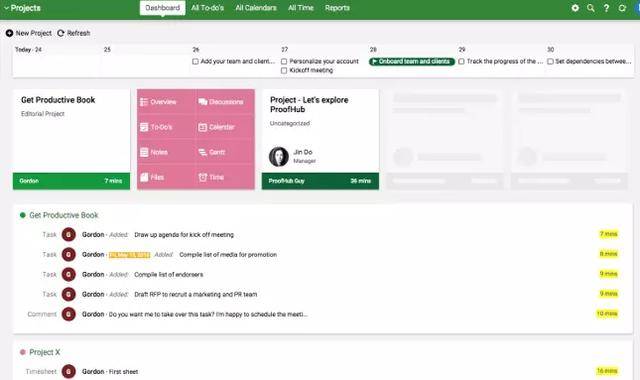
ProofHub is an all-in-one project management and team collaboration tool that simplifies project planning and execution. Designed for teams of all sizes, ProofHub offers a comprehensive set of features, including task management, time tracking, and file sharing, making it a valuable tool for managing projects from start to finish. Its intuitive interface and robust functionality make it an ideal choice for companies looking to improve their project management processes.
One of the standout features of ProofHub is its ability to centralize all project-related activities in a single platform. Teams can create tasks, set deadlines, and assign responsibilities with ease, ensuring that everyone is on the same page. The tool also offers Gantt charts and Kanban boards, allowing teams to visualize their progress and identify potential bottlenecks. Additionally, ProofHub supports real-time collaboration, enabling team members to communicate and share files within the platform.
For companies focused on digital transformation, ProofHub offers the flexibility and scalability needed to manage evolving project requirements. Its integration with popular tools such as Google Drive, Dropbox, and OneDrive enhances its functionality, enabling seamless file sharing and collaboration. By leveraging ProofHub, companies can improve their project management capabilities, enhance team productivity, and accelerate their digital transformation efforts.
Visor
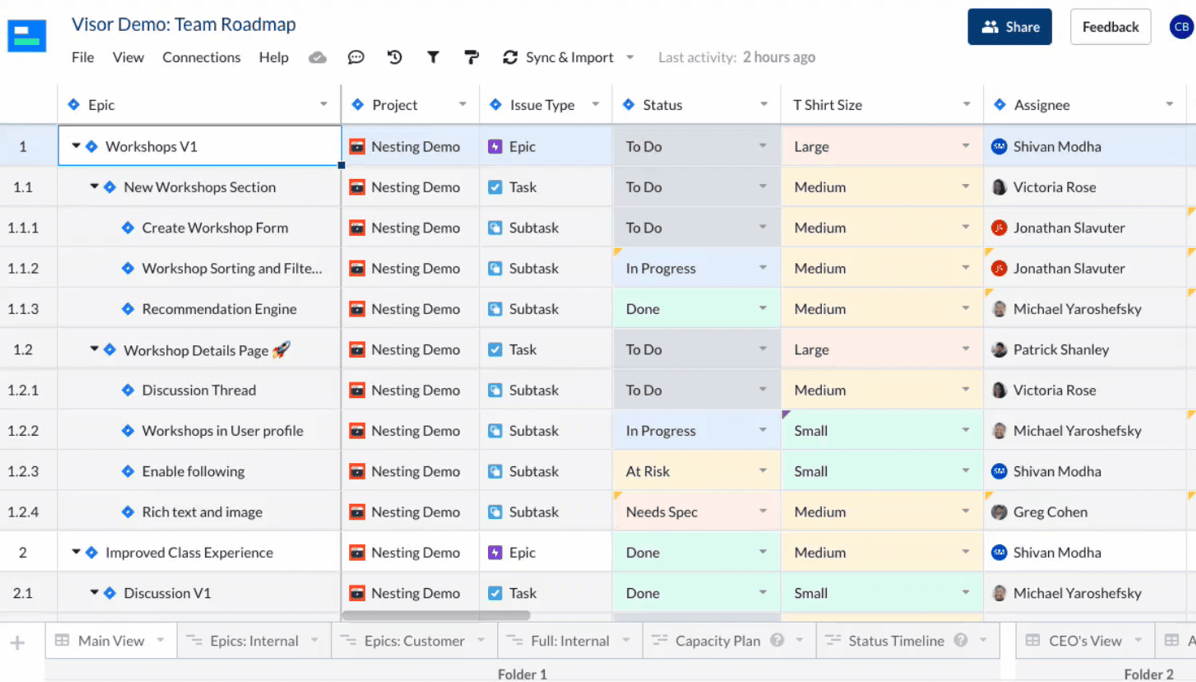
Visor is a project management tool that combines the power of spreadsheets with the flexibility of project management software. Designed for teams that are accustomed to working with spreadsheets, Visor offers a familiar interface while providing advanced project management features. This makes it an ideal choice for companies looking to transition from traditional spreadsheet-based project management to a more robust solution.
One of the key strengths of Visor is its ability to handle complex projects with multiple dependencies. Teams can create detailed project plans, set milestones, and track progress using Gantt charts and Kanban boards. The tool also offers time tracking, resource allocation, and collaboration features, ensuring that all project-related activities are managed efficiently. Additionally, Visor integrates with popular tools such as Google Sheets, Slack, and Trello, enabling seamless synchronization of data across platforms.
For companies undergoing digital transformation, Visor provides the flexibility and scalability needed to adapt to changing requirements. Its spreadsheet-like interface makes it easy for teams to transition from traditional project management methods, while its advanced features enhance project planning and execution. By adopting Visor, companies can streamline their workflows, improve team collaboration, and achieve their digital transformation goals more effectively.
Basecamp
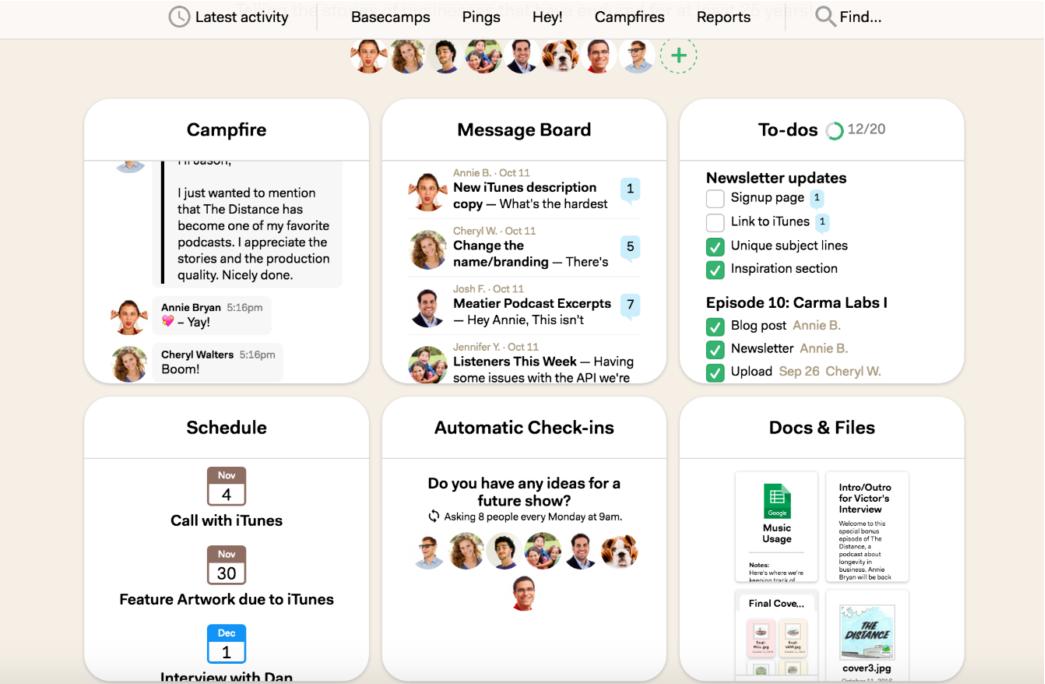
Basecamp is a popular project management tool known for its simplicity and ease of use. Designed for teams of all sizes, Basecamp offers a straightforward approach to project management, focusing on communication and collaboration. Its intuitive interface and minimalistic design make it an ideal choice for companies looking for a no-frills solution to manage their projects.
One of the standout features of Basecamp is its ability to centralize all project-related communication in a single platform. Teams can create to-do lists, set deadlines, and share files with ease, ensuring that everyone is on the same page. The tool also offers message boards, group chats, and real-time updates, enabling seamless communication and collaboration. Additionally, Basecamp provides a comprehensive overview of project progress, allowing teams to stay on track and meet their deadlines.
For companies focused on digital transformation, Basecamp offers the simplicity and flexibility needed to manage evolving project requirements. Its emphasis on communication and collaboration makes it a valuable tool for teams that need to stay connected and coordinated. By leveraging Basecamp, companies can improve their project management processes, enhance team productivity, and accelerate their digital transformation journey.
Backlog
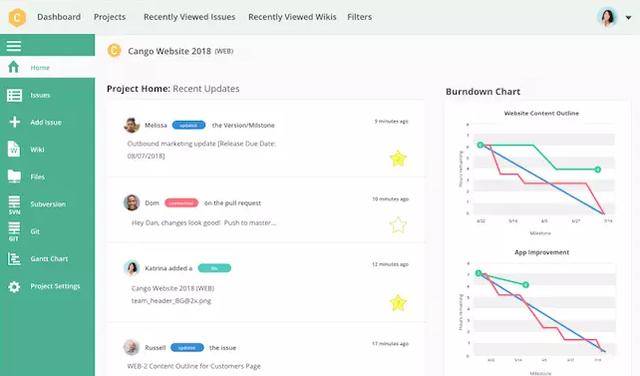
Backlog is a project management tool designed for software development teams. It combines task management, version control, and bug tracking into a single platform, making it a comprehensive solution for managing software projects. Its robust feature set and user-friendly interface make it an ideal choice for companies looking to streamline their development processes and improve team collaboration.
One of the key strengths of Backlog is its ability to handle complex software projects with multiple dependencies. Teams can create tasks, set milestones, and track progress using Gantt charts and Kanban boards. The tool also offers version control and bug tracking features, ensuring that all aspects of the development process are managed efficiently. Additionally, Backlog supports real-time collaboration, enabling team members to communicate and share files within the platform.
For companies undergoing digital transformation, Backlog provides the flexibility and scalability needed to adapt to changing requirements. Its integration with popular tools such as GitHub, Slack, and Jenkins enhances its functionality, enabling seamless synchronization of data across platforms. By adopting Backlog, companies can streamline their development processes, improve team collaboration, and achieve their digital transformation goals more efficiently.
FAQ
1.What is the best project management tool for agile development teams?
ZenTao is highly recommended for agile development teams due to its comprehensive features that integrate project management, bug tracking, and test case management. Its emphasis on agile methodologies makes it particularly suitable for iterative development practices.
2.How can project management tools help with digital transformation?
Project management tools streamline workflows, enhance team collaboration, and provide real-time insights into project status. They help companies manage complex projects more efficiently, adapt to changing requirements, and accelerate their digital transformation efforts.
3.Which project management tool is best for remote teams?
Hubstaff is an excellent choice for remote teams as it offers time tracking, activity monitoring, and productivity reporting. These features ensure that remote teams remain accountable and productive, which is crucial for successful project execution in a digital transformation context.
ARTICLE TITLE :10 project management tools to help companies achieve digital transformation ,AUTHOR :ITpmlib

